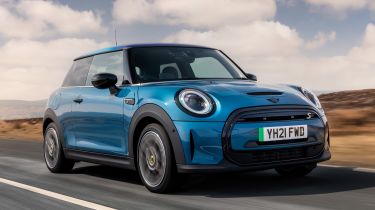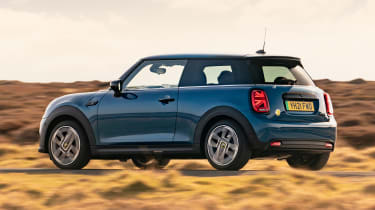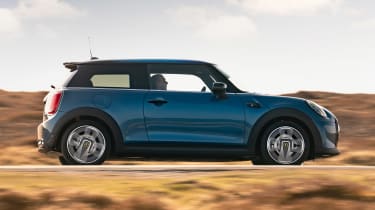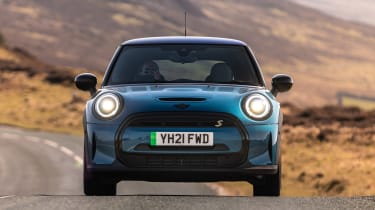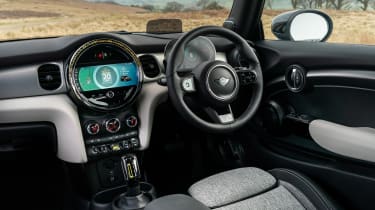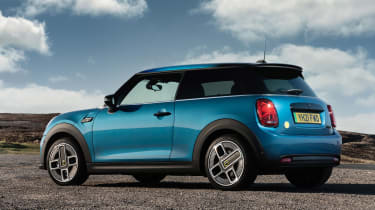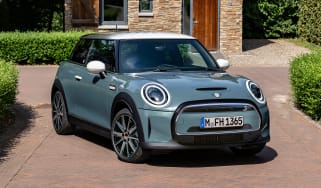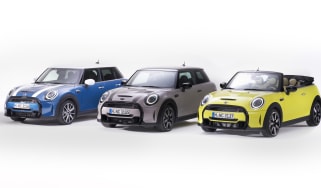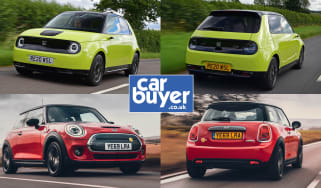MINI Electric review – retro-styled EV fun, but a limited range (2020-2024)
"The MINI Electric is quick and stylish but its shortcomings mean you may not want it as your only car”
Pros
- Desirable
- Cheap to run
- Peppy performance
Cons
- Practicality
- Limited range
- Expensive to buy
Verdict – is the MINI Electric a good car?
The MINI Electric offers EV motoring in a stylish and cute package. It’s a car that will suit buyers looking for an electric runabout to do short trips around town, while offering some fun driving dynamics in the process. It’s not perfect – longer drives could be a challenge due to its limited range – and it’s quite expensive, but it’s hard to resist its retro charm and desirability.
MINI Electric models, specs and alternatives
In its latest iteration, the MINI is now offered as an EV, badged as the MINI Electric. It joins a growing number of small cars, such as the Honda e and the new Fiat 500, which also offer fully-electric motoring mixed with retro charm at a similar price point. Buyers may also be considering rivals such as the Renault ZOE, Peugeot E-208 and Vauxhall Corsa Electric, and the MINI Electric’s fun-to-drive credentials and power figures also put it up against the Abarth 500e electric hot hatchback.
 MINI Cooper review – cheeky and fun as ever, but has a harsh ride
MINI Cooper review – cheeky and fun as ever, but has a harsh ride
With an all-new MINI Cooper Electric just around the corner, designed from the ground up to be fully electric, this generation is due to go off sale in 2024, and for that reason, it’s likely to be offered with some compelling deals as it nears the end of its lifecycle, so it’s worth keeping an eye out.
More reviews
Unlike the overtly quirky Honda e, the MINI treads a slightly more understated path. It's based on the petrol three-door Hatch but has a battery pack squeezed into the transmission tunnel beneath the car. An electric motor sits under the bonnet and power goes to the front wheels. For a few people, the fairly unadventurous approach will seem like a missed opportunity, but most MINI fans are expected to like the idea of simply being able to pick an electric version of a car they already love. There are a few styling touches that are exclusive to the MINI Electric and, as always, personalisation is a big part of the MINI’s appeal.
 The 10 best electric cars in 2025
The 10 best electric cars in 2025
The MINI Electric only launched in 2020 but in April 2021 it was updated. It’s not that the MINI Electric is selling slowly, rather that the rest of the hatchback and convertible ranges were updated so it made sense for the electric model to match.
The changes included a bigger grille than before, surrounded by gloss black trim instead of shiny chrome. For the Electric version, it includes a big slab of body-coloured plastic, as the electric powertrain needs a lot less cooling than a petrol engine so the air intakes can be smaller to improve efficiency. The fog lights have been replaced with vertical vents for the brakes, in an attempt to make the car look wider.
Metallic paint and alloy wheel upgrades were made available at no extra charge, making it easier to personalise your car, while three new colours were introduced, as well as new alloy wheel designs and a ‘Multitone’ roof that’s sprayed in three colours. One of the more interesting alloy wheel designs is made to look like a three-pin plug socket.
The MINI Electric comes in Level 2 and 3 trims, with the Level 1 having been discontinued. All cars now come with an 8.8-inch touchscreen, which was updated to work more like a phone, as well as cruise control, dual-zone air conditioning and Apple CarPlay. Now that the range starts from Level 2, cars also come with heated seats, parking sensors and a rear-view camera, while Level 3 adds wireless phone charging, parking assistance and a panoramic sunroof.
The interior is of a fantastically high quality for a supermini, except for the new steering wheel buttons that have been more recently introduced. Unlike the rest of the materials in the interior, they feel quite cheap, which is not good when you are going to use them regularly.
MINI is a sporty brand and while electric cars are often seen as something of a backward step in terms of driving thrills, the Electric hardly feels like a betrayal from behind the wheel. With 181bhp and as much torque as a diesel but absolutely no lag, even the MINI's lack of noise can't disguise its lively acceleration. It can get from 0-62mph in 7.3 seconds but feels faster in traffic, where nipping into gaps becomes child's play. On UK roads it's just as fun as sporty MINIs and feels very surefooted, helped in part by a centre of gravity that’s 30mm lower than that of the MINI Cooper S. The Electric is, however, 145kg heavier.
Perhaps the main worry for prospective buyers will be the MINI's 145-mile range, which just beats the 125-mile range of the Honda e but is a long way behind the Peugeot e-208's claimed 225-mile range and the 245 miles you can travel in a fully charged Renault ZOE. On our test drive, which included town driving, a twisty B-road and a stretch of motorway, the car was offering closer to 104 miles between charges, which could be an issue for some drivers.
MINI has been somewhat hampered by the space available, squeezing a 32.6kWh battery pack under the car, compared with the e-208 and ZOE that have batteries of around 50kWh. The British-based manufacturer claims the MINI is aimed mainly at people who live in cities, but for rare longer trips, the MINI Electric is capable of 50kW fast charging that can get the battery from 0-80% in just 35 minutes, which is behind rivals such as the Abarth 500e which can charge at 85kW speeds, taking just 25 minutes.
Charging at a 7kW home wallbox, which will be what a lot of buyers do, takes just under three and a quarter hours. If you’ve only got a normal plug socket nearby, it’ll take 12 hours to recharge.
Range, charging & running costs
The British brand also says that when it ran a trial of electric MINIs, the 130 or so users drove an average of 29.7 miles a day, so would only need to charge the MINI Electric twice a week, at a cost of a few pounds a time (depending on the exact electricity tariff).
MINI's claimed 144-mile range and 28.9kWh usable battery capacity isn’t the best, though, and when we tested it, we found it returned significantly less than that – we managed just 104 miles. That means longer journeys will take lots of planning, and its 50kW charging capability is very slow compared to other modern EVs.
Compared to petrol and diesel superminis the MINI Electric is more expensive to buy but cheaper to run thereafter. Road tax is free instead of the standard annual rate and company-car drivers will pay barely anything in Benefit-in-Kind (BiK), a significant saving. Maintenance costs should also be lower because electric cars don't need new oil, spark plugs or timing belts and tend to be easier on their tyres and brakes thanks to regenerative braking.
Electric motor, drive & performance
MINIs are renowned for their nippy performance and the Electric is no different. The official 7.3-second 0-62mph time actually feels conservative because the 181bhp MINI Electric is so quick away from a standstill. Its motor is derived from that used in the BMW i3 and sends its power to the front wheels, pulling the MINI to a 93mph top speed. Even on the motorway there's a noticeable surge of acceleration when you press the throttle pedal. The MINI is composed and accurate in corners, and importantly it's just as fun as the conventional sporty MINIs we've tried, despite a hint more body lean than the petrol Cooper S. In testing, however, it has to be said that the Abarth 500e offers a slightly keener response than the MINI Electric on the road, despite its lower power figure.
One advantage of the MINI Electric's motor is a noticeable improvement in refinement, which is excellent for a supermini. It's a trait shared with the Honda e, and even if the MINI can't quite match the Honda for ride comfort, it's far from uncomfortable. The Electric’s ride isn’t rough but bumps are certainly felt and the car can feel fidgety at low speeds. No petrol engine humming away in the background does mean that the wind and road noise is more obvious in the Electric. If it’s hot-hatch levels of theatre you’re after, the lack of a thrumming four-cylinder petrol engine might disappoint some drivers.
As with the combustion-engined MINIs, a number of driving modes change the way the Electric feels and performs. ‘Green’ feels like it’s almost trying to stop you from accelerating but the upshot is that the mode increases the indicated range by as much as 15 miles, while Green+ aims to boost range even more by turning off the air-con and making the accelerator less responsive. Sport unleashes the full power and makes light work of getting up to speed, while Mid is a good compromise between performance and efficiency.
Frustratingly, while there are two modes for the intensity of the regenerative braking, the MINI Electric defaults to the stronger of the two every time you restart the car – we’d prefer it to remember the setting it was last left in.
Interior & comfort
Anyone familiar with a recent MINI interior will be right at home in the electric version; there's the same dinner plate-sized round dashboard with MINI's version of the iDrive infotainment system that’s 8.8 inches in size. We prefer this system against that of rivals such as the Fiat and Abarth 500e, because it feels crisp and colourful to look at and easier to use – you can either use the touchscreen or a small click wheel on the centre console which works better on the move. There’s even a large physical volume knob and physical shortcut button to adjust driver assistance systems.
The digital display ahead of the driver is unchanged; it was introduced on the MINI Electric and now is fitted in more of the brand’s models. It shows everything from your speed to remaining range, although we found that the outer parts of it are hidden behind the steering wheel.
Interior quality is mostly superb, feeling more luxurious than most will expect in the supermini class, placing the Electric on par with the Honda e and the surprisingly impressive Renault ZOE. We like the MINI’s toggle switches and retro rotary dials because they look great and are easy to use.
Equipment
Unlike other models in the MINI range, the main trim levels are simply called Level 2 or 3 – as of early 2024 Level 1 is no longer offered. Each version shares sat nav and Apple CarPlay (but still no Android Auto), connected services, cruise control and dual-zone climate control. Now that the range starts from Level 2, every car gets a rear-view camera, heated part-faux leather seats and different paint and wheels.
Turning up the radio exposes that the standard audio system can sound tinny, but Level 3 cars get a much-improved, high-end Harman Kardon stereo instead. This trim also gets a panoramic sunroof, adaptive headlights, semi-automatic parking and a Harman Kardon stereo.
Options
The MINI Electric can be personalised with a choice of up to seven different wheel options at no extra cost – one of these is a set of 17-inch alloys with a novel design mimicking a three-pin plug socket. It can also be specified in a choice of seven different colours – again, at no extra cost. A body-coloured, white or black roof and/or mirrors can be had at no extra cost, while the multitone roof and mirror colours come at an extra £650 at the time of writing.
Practicality & boot space
By managing to fit the battery pack under the floor of the car, space inside the MINI Electric is no different to other three-door versions of the MINI Hatch. Sadly, that's not saying much, as the conventionally powered MINI is hardly renowned for its practicality. Getting into the back seats requires some flexibility and there's precious little space once in position. If you plan on carrying passengers or children on a regular basis, most rivals with five doors will be a better bet, even if there are two ISOFIX points in the MINI.
The boot measures 211 litres, which beats the meagre 171-litre boot found in the Honda e but is a noticeable 100 litres smaller than the Peugeot e-208's boot. Flip up the false boot floor and there is a handy place to keep its charging cable or valuables, but this can only be accessed when the boot is empty.
Reliability & safety
The MINI Electric is based on the regular petrol and diesel versions, and aside from its electronics, should actually be simpler and more reliable in theory. That's because an electric motor has far fewer moving parts than a combustion engine, no oil, and does away with things like a conventional clutch and gearbox.
If you're worried this is MINI's first electric car, that's also not strictly true. MINI itself experimented with an electric car a decade ago, building a limited number of MINI E models and loaning them out for field trials. The exercise indirectly led to the BMW i3, and now MINI benefits from parent company BMW's electric expertise.
The MINI hatch came 59th out of the top 75 cars in our 2021 Driver Power survey. It’s likely that many respondents have the regular petrol versions, given that it gets a poor mark for running costs. Practicality was rated badly, as you’d expect, but the styling and driving experience were ranked much more positively. These are qualities that the MINI Electric shares.
As a brand, MINI finished six places above parent company BMW in 15th place out of 32 manufacturers. Overall, only 12% of owners reported faults in the first year, which is lower than average, on par with Fiat and beaten only by Suzuki, with just 8%.
The standard MINI Hatch scored four out of five stars in Euro NCAP crash tests; a rating we expect will also apply to the Electric. It features a bonnet that pops up in a collision to help protect pedestrians, six airbags and a passenger airbag deactivation switch. MINIs also come with an eCall system that can automatically alert the emergency services if the car is involved in a serious collision.

